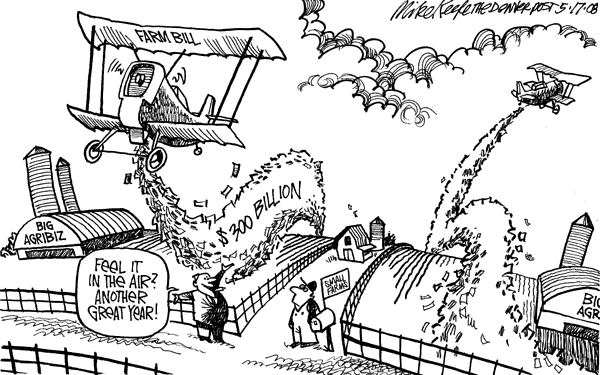
One of the biggest factors in farming unprofitability today is government intervention. In his eye-opening book, War on the Poor, historian Clarence B. Carson claimed, “ There is no reason, except for government interference, that farming should not be as profitable an undertaking as any other productive pursuit.” Why is the government’s intervention such a bad thing?
First, the annual welfare that the government doles out each year to ‘help’ farmers that are struggling promotes mediocre farming. When the government helps keep unprofitable farmers in business, it tends to put all the profitable farmers out of business. If my neighbor is being a bad farmer and wastes his resources such that he loses money, instead of eventually going out of business and making room for someone who will be a better steward of his farm, he stays in business. He can sell at a loss, undercut me, and go on year after year because of government subsidies. Of course, most commodity farmers don’t undercut on purpose. They have to take whatever the market price is at the time. But the market price reflects the fact that farmers can sell crops at less than it costs to produce it and still make a profit because of subsidies. If there were no subsidies and farmers stopped growing crops they couldn’t sell profitably, then the prices would soon rise to a realistic level that would allow for profitable production.
Second, government regulation of food production and processing makes it difficult to sell any type of meat produced by a small-scale, entry level farmer. These regulations are designed for a system where farmers take whatever wholesale price they can get while selling to a large company. But for any small farm this is prohibitive. The best way to make money on a small farm is direct sales, which regulations inhibit. There are creative ways to deal with this, as farmer Joel Salatin has helped show in his book Everything I Want to Do is Illegal. But when compliance with government regulations is practical only for large corporations (who can absorb the cost) it limits the options of most small producers.
Government interference has resulted in the death of the family farm, a debt-based agricultural production model, and a lack of new farmers. It has made the occupation of farming unattractive compared to other pursuits and has made it very hard to start farming.
It is possible to make a living farming because many people are doing it, including me. With God all things really are possible if they are according to His will.
Hope for Christian Farmers
So, as Christian farmers, how do we respond? Do we just sigh and say like everyone else, “Well, I guess there ain’t no money in farming anymore.” and resign ourselves to farming as a hobby? Do we quit altogether?
No. Despite the intervention of the government and the lack of financial return on agriculture, I believe farming is still a worthwhile pursuit.
First, I believe that someday farming will again be recognized and rewarded as one of the most fundamental and essential endeavors in our economy. It is not unlikely that the current industrial system of agriculture will someday fail because of its dependence on so many other inputs, one of which is oil. And if it does fail people will still need food. Growing food will quickly rise to the top of valued skills.
This is exactly what happened in Cuba in the 1990’s. When the USSR collapsed and the U.S. imposed its embargoes, Cuba’s economy collapsed because of almost no imports, including oil. Cuba’s agriculture, which was very industrialized, began to falter for lack of fertilizer, chemicals, and fuel and parts for tractors. Food became scarce. The average Cuban lost twenty pounds those first several years. Soon people began to try to grow food. Abandoned lots in the city were cleaned up and planted for food. Large, state-owned farms were divided up between small farmers. People who had been professional business people switched to agriculture. Today, Cuba grows the majority of its own food. Farming is one of the most profitable professions because farmers have food that people want to buy and don’t have to buy food themselves. One Cuban farmer, who was formerly a musician, mechanic, and electronics designer, now makes his living growing food on the roof of his house in the city. (The Power of Community, How Cuba Survived Peak Oil www.powerofcommunity.org)
With the current violation of God’s principles of economics by our government, I believe that America could easily face the same challenges that Cuba faced. And farming would once again be a valuable skill for Christians to have.
Second, if we as Christian farmers begin to glorify the Lord in the way we farm, using His wisdom and applying His principles, I believe our farms can be so productive that we can make a profit despite the intervention of government. God is the best farmer in the whole world . . . the whole universe in fact! . . . and if we learn from Him I believe we can eventually beat the socks off the worldly producers of today.
Third, the reward of farming is more than just money. One of the biggest benefits of farming is the lifestyle it offers. When I get up to work in the morning I am not motivated by the amount of money I will make that day. I actually rarely think about it. Instead, I am enjoying the work God has given me of caring for and working His creation while walking with Him, enjoying the relationships of my family, displaying the Gospel to those around me, and providing for my needs. Farming to me is a lifestyle of ministry and worship. I guess you could describe what I do more accurately as agri-lifestyle, rather than agri-business.
(The previous article is an excerpt from the chapter Agri-lifestyle. I am sorry for the delay since the last post. The farming season is cranking up and it is getting harder to get around to computer work! I hope to be able to start featuring some farming ‘how-to’ videos as the season progresses. Thanks for all your support and encouragement.)




Wonderful article. Looking forward to those videos.
My husband often says, “If you’re farming to make money, you’re in the wrong business. I farm because I love farming.”
Good article and I am enjoying the book and hope to have a review up soon.
Great article, thanks. We have similar problems in Europe too and I hope some day to be able to look at how young farmers are encouraged to get into farming as there is so much spare land here in Latvia and I don’t want it all sold to large agribusinesses, where they provide low grade jobs and take the profits out of the country. Currently I am studying some of the stumbling blocks to agriculture, which in our area is wild hogs, that create a lot of damage and make agriculture even more unprofitable. Hopefully I can move on from this topic to look at the other systems, but your article reminds me why I am doing what I’m doing.
Interesting to hear that Cuba had to make a transition much like I suspect we will have to make someday. I’m encouraged to know that it CAN be done (even if it’s with a bit of a weight loss!).
I’m about half way through your book, Noah, and it’s very good! I’m a slow reader and busy mom, but I also hope to do a review on it soon and if you’re interested, host a give-away. (You might want to check out my blog when you get a chance to see if you think it’s a fit for promoting your book. I think my readers would like it very much!).
Amy,
If you are interested in learning more about Cuba and agriculture, check out the documentary ‘The Power of Community’ http://www.powerofcommunity.org/cm/index.php It is definitely not Christian, but the facts are very interesting.
Thanks so much for taking the time to read my book. I totally understand about it taking a while. I love to read, but have precious little time as a farmer so it takes a while to make it though many other books than the Bible.
I would love for you to do a review and give-away. Just let me know how it works because I’ve never done one before.
Noah
Great! I’ll be in touch as soon as I finish the book!
Thank, Noah!
Very interesting post, Noah! We all need to understand the government’s impact. It seems that some have no idea what this could mean for America! Anyway, it was a joy to meet you and your wife at the Family Economics Conference! I am reading your book and enjoy it! Like Amy, above, I would love to do a review and giveaway if that is something you are interested in!
To God be the glory!
Susie,
It was also a joy to meet your family at the conference! I would love it if you did a review and giveaway on your blog. I am not doing traditional advertising because I want the book to be spread ‘word-of-mouth’ by people that feel it is important.
As we drift further from what God intended for us, we will continue to see a decline in our world. Government not tethered to a respect for the Creator and a respect for it’s citizen will become a tyrannt. Hopefully this movement back to simple ways, among God’s people, will affect our culture and bring revival.
Todd,
Amen! It really is encouraging to see the ‘revival’ that God is doing in the hearts of his people across the country, with a return to his Word. This is the only solution to the problems we face today. God’s Kingdom is heart based, and it must be built upon changed hearts, not changed Presidents.
I’ll join the chorus a little late here, brother, but indeed, a fine post! The paradigm shift in Americans’ thinking over the last several decades is immense. I’m only a generation away from the farm here in TN, but going back to that has for years been seen as something retrograde. As I may have said before, I think the coming financial upheaval may be God’s way of getting our attention. If we’ll heed His correction, we can get back to where we need to be.
May it be!
This STINKS